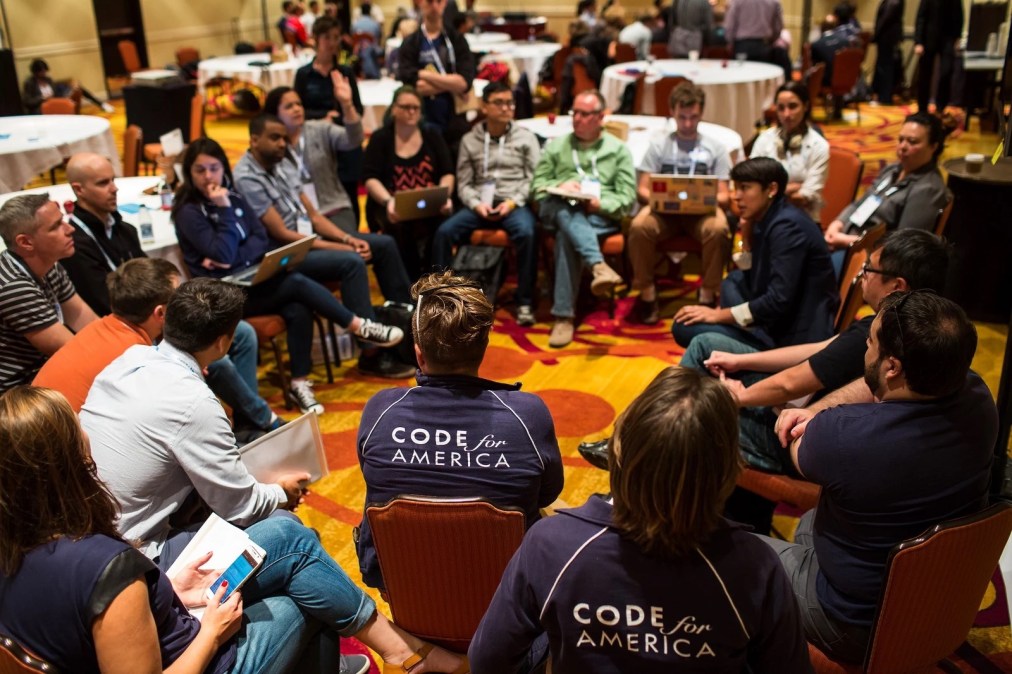- Feature
- Digital Services
Cut loose, Code for America’s former local brigades look to regroup

As Code for America gathers in Washington this week for its annual summit, it’s doing so for the first time since a decision earlier this year to end its affiliation with its longtime network of “brigades,” the local chapters of civic-minded technologists who’d been supported by the organization for more than a decade.
The February announcement from Code for America CEO Amanda Renteria rocked the Brigade Network — roughly 60 volunteer chapters were told that the 501(c)(3) organization would no longer provide fiscal sponsorship, a legal arrangement providing financial oversight for volunteer groups that lack the resources to do so on their own. Code for America also told the brigades that many of them would also need to rebrand if their names began with “Code for,” a common naming convention used by groups like Code for Philly, Code for D.C. and dozens of other chapters.
While the immediate reactions to Code for America’s decision to roll back the brigade program included some local groups sounding a “death knell” and accusations that the organization was clumsy in how it handled the decision. But a few months on, the decision also reveals an evolution in relationship between Code for America and the collection of local affiliates that leaned on the 13-year-old national nonprofit for its convening power, while also operating with a high degree of autonomy.
“There was definitely a way to do this more gracefully I feel with regard being able to keep the planning, and being able to have everything handed back over to the local volunteers without much fuss,” said Christopher Whitaker, who until 2020 worked as Code for America’s brigade program manager.
Whitaker is an organizer of a new group called the Alliance for Civic Technologists, which is aiming to be a new umbrella organization for Code for America’s former local chapters. The group launched Tuesday with the participation of brigades in Boston, Seattle and 14 other cities.
In an interview, Whitaker said talks about regrouping the brigades out from under the Code for America banner started “almost immediately” after Renteria’s Feb. 1 announcement.
“This is a community that’s been working together for almost a decade,” he said.
The Alliance for Civic Technologists, Whitaker said, isn’t as robust an operation as the old Brigade Network, which in addition to providing the local groups with fiscal oversight and online organizing spaces, also staged an annual conference — separate from the main summit — known as Brigade Congress. Whitaker said the new alliance has a Discord server for its members as they embark on a “co-creation” process to define what form it should take, and there are plans to hold an initial meeting next month.
But the individual brigades themselves are still responsible for charting their own post-Code for America paths, including finding new fiscal sponsors. (Many have moved to the Open Collective Foundation, a nonprofit that specializes in providing that financial and legal work for volunteer and charitable groups.)
“Right now brigades need to be able to be stable,” Whitaker said.
‘It’s not crazy’
Current and former Code for America employees say the split between the national organization and the brigades was building for a while, especially as Code for America grew more committed to software development for governments and a $100 million donation it received in 2022 to launch its Safety Net Innovation Lab.
“I think for us, it’s really just recognizing that at this point in time, with the type of impact that we’re having, really working shoulder to shoulder with government, that we’re just not the best organization to be a convener of local volunteer groups,” Tracey Patterson, Code for America’s chief program officer, said in an interview Tuesday on the sidelines of the group’s summit.
While she called the brigades a “big part” of Code for America’s history, she said its mission has shifted over the years to the point that supporting dozens of decentralized groups isn’t the best use of its resources.
Em Burnett, who was laid off as associate director of the Brigade Network program earlier this year, conceded it was likely a pivot for the organization.
“It’s not crazy the decision was made,” Burnett said. “The relationship [between] Code for America and the brigades, that was fraught for a long time. A traditional nonprofit structure supporting these decentralized autonomous grassroots groups — built into that is a lot of tension.”
The brigade program, though, had actually seen its annual budget increase to more than $3 million as recently as 2022, with 14 full-time employees and funding for contractors, stipends and the Brigade Congress event, according to budget documents seen by StateScoop. Burnett had also overseen a 2021 process — known internally as “ReVisioning” — that aimed to overhaul the brigades’ role, with recommendations including more bottom-up project generation, volunteer recruitment amid a pandemic and creating more opportunities for brigade members to collaborate with their local governments.
But the report the ReVisioning effort produced last year didn’t last long before Renteria changed course. In a Jan. 20 companywide memo obtained by StateScoop, Renteria explained why Code for America was backing away from the proposals Burnett’s team had fielded.
“We learned that this post-pandemic environment is not as conducive to volunteer engagement for more reasons than just COVID,” Renteria wrote. “Volunteerism is down across industries, there are growing privacy and security concerns with volunteers partnering with governments, and short-term projects are often unable to have a systems-level or lasting impact on equity and/or poverty alleviation without continued partnership and engagement.”
‘There’s always been a tension’
Renteria cited several of the same reasons in the public announcement she made to the brigades a few weeks later, as well as the fact that Code for America serving as the local groups’ fiscal sponsor was “not been as empowering or effective as we hoped it would be.”
The Jan. 20 memo also announced that Burnett and many others on the Brigade Network team were being let go.
“The costs definitely grew,” Patterson, the program officer, told StateScoop on Tuesday. “I think as we tried to say, OK, let’s double down on trying to be a convener that can provide resources that can bring people together, we just really came to the difficult decision that it isn’t the best use of our time and staff time in order to try to do that, especially when the costs do outpace what we’re able to fundraise to do that.”
With the memorandum of understanding between Code for America and the brigades expiring June 30, the local groups have just a few weeks left to find new fiscal sponsors and — if their names begin with “Code for,” a prefix the national organization had been licensing — new branding. There is a grace period through Dec. 31, Patterson said.
But separating from Code for America may actually cement the autonomy local volunteers have long prized. Many of the local groups existed before Code for America was founded and were openly courted when the organization was building out its volunteer network. But there’s a difference between ragtag groups of coders offering to help their home cities and a professional organization with tens of millions of dollars in funding to develop major digital-services products.
“I think the natural tension has always been that brigades because they live and work in the places where they’re volunteering, they know their communities, they know where the problems are, they know their community partners,” said Whitaker, the Code for Chicago leader who’s organizing the new Alliance for Civic Technologists. “There’s always been a tension between what headquarters is working on, and what the local groups are working on, which may not always intersect, and for us as ACT, I don’t think it needs to.”
A ‘clean break’ and a reset
Patterson said Code for America is also in the process of determining what its relationship with the volunteer civic-tech community will be.
“We’re really wanting to focus, as transition from the brigade program as it was, that we’re being clear about that,” she said. “And so we want to make sure that we’re defining that relationship and not muddying it by suddenly coming out with a new idea of how we’re going to work with volunteers. But we do see volunteers, along with community residents, along with aspiring technologists who haven’t really broken into the field yet themselves as a part of our network.”
She did, though, say that the broad downturn in volunteerism, rigors of the pandemic and costs of maintaining the brigade network made it the right time for a “clean break.”
Burnett, the brigade network manager laid off earlier this year, said they got started in civic tech through the Portland, Maine, brigade because of an interest in topics like open-source development and other technologies.
“People who want to get involved in Code for America are people who think critically about open data, AI and all these things,” Burnett said. “People get involved because they care about those things.”
The sunsetting of the brigade program could also be a reset for the volunteers, Whitaker said.
“The [Alliance for Civc Technologists] is going to be set up exclusively to help support a network of volunteers,” he said. “We’re not going to be building products. We’re not going to be building anything. That’s that’s not what it’s for. It’s to support the network. I’m sort of excited to get people at the table, talking about ideas.”






